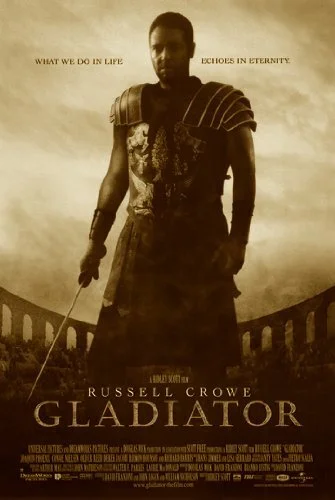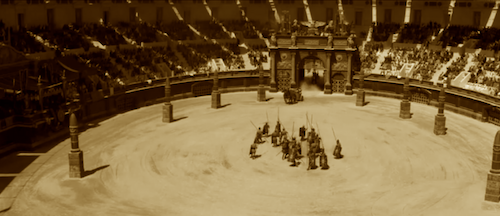Gladiator
This review is a part of the Best Picture Project: a review of every single Academy Award winner for the Best Picture category. Gladiator is the seventy third Best Picture winner at the 2000 Academy Awards.
One day, I may create a “Top 25 Films that Changed my Views of Cinema” list. I feel like that’s a topic of discussion that isn’t brought up enough by film academics or critics. It’s as if those who write about film need to have a clean record for the public to see. Nonsense. We all grew up loving garbage films. We know we did. Anyway, my point is that there are many turning points to get to where we all are when it comes to our taste in films. Although I am far from crazy about Ridley Scott’s Gladiator in 2019 (it should have been Traffic’s award!), I will forever appreciate it being a significant entry in my list of films that made me see the visual medium in a whole new way. I was about ten years old. It was my first gory film (well, it’s gory considering my age and naivety). It didn’t even feel like this film was two and a half hours. I was a boy now fascinated with this tale of Maximus: an army officer forced into slavery, and his clawing back into a position of power in the arena.
As a thirty year old, much of that luster from Gladiator has disappeared. I find the moments of scheming and strategizing to be slow enough that each battle scene becomes the highlight of the next little while. What I will say is Gladiator felt like a major progression for the historical epic genre, with its incorporation of evolving shooting techniques with all of the know-how when it came to set and costume designs. Old methods were being merged with new executions. Gladiator didn’t do this first, but Scott clearly knows how to make a blockbuster (good or bad, his films usually make tons of money). Either way, a renaissance of historical tales from way back were finally cool again in the modern age. Romantic epics were all the rage, but why not romanticized epics? Thus, Gladiator made a splash. Maybe my current apprehension is due to the films that followed in Gladiator’s footsteps doing what Gladiator did, but better.
Each arena sequence in Gladiator is a rush to behold.
So, yes. I find Gladiator a little overlong, and a bit hammy. However, there is an effort made in virtually every scene. Many of the film’s faults is the test of time. Some effects, backdrops, and looks just don’t come off as well as they used to. The immersion of 2000 feels more like a half decent sheen in 2019. That usually isn’t a problem, except for Gladiator’s reliance on them. If you’re okay with hooking yourself onto all of the political gameplay yourself, then Gladiator is not a problem. I really can’t take jabs at the film too much. For every glacial conversation, we have combat that still holds up very well, thanks to dynamic editing, complex choreography, and the build ups created by the Zimmer-Gerrard score, the Crowe-Phoenix tension, and the good old Ridley Scott passion. Of course I was obsessed as a kid. I had never seen anything like this. I know I had said that subsequent historical epics have been better, but there have also been many duds. Gladiator set a precedent to some degree, clearly. Ignore the occasional lethargy, and you will arrive at moments of glory, determination, and pure early 2000’s movie magic.
Andreas Babiolakis has a Masters degree in Film and Photography Preservation and Collections Management from Ryerson University, as well as a Bachelors degree in Cinema Studies from York University. His favourite times of year are the Criterion Collection flash sales and the annual Toronto International Film Festival.





